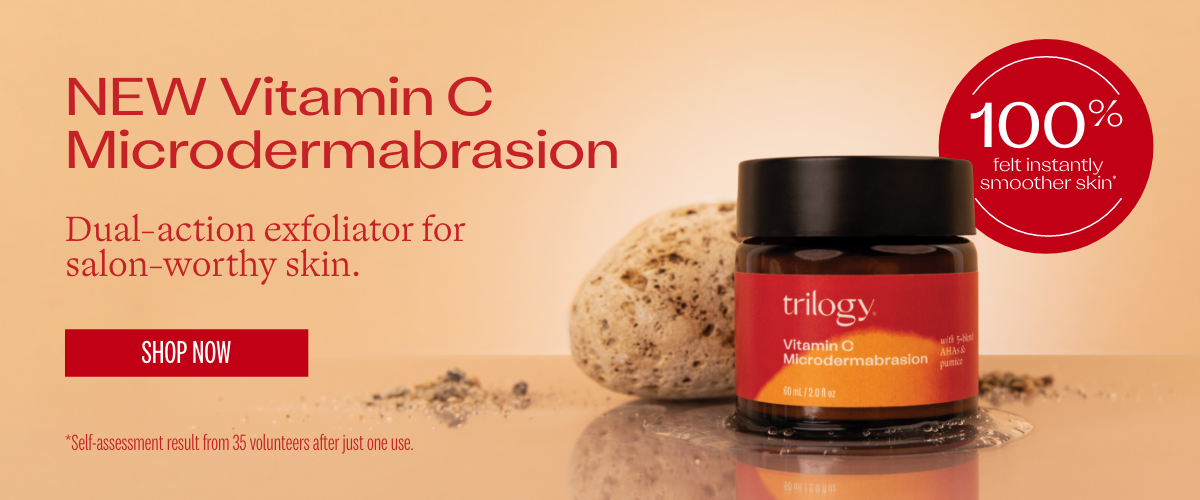All of our cells, including our skin cells, are constantly being renewed. As our older skin cells die, they fall away and are replaced by new cells. If left alone, those old cells can take a while to fall away which results in flaky skin. When our skin is flaky, is makes it hard for moisturiser to do its job, our serums don’t penetrate the skin (and instead sit on top of those dead cells), and if you wear makeup, it doesn’t sit well and can pill or flake.
Exfoliation is what buffs them away and leaves skin smooth, refreshed, and with only fresh skin cells and no (or a lot fewer) dead ones.
The average life cycle of a skin cell is around 30 days (although it is a lot longer the older we get) but they don’t all renew at the same time. It would be handy if they did, as then we could just exfoliate once a month. Therefore, regular exfoliation means our skin is polished, fresh, and ready to absorb our skincare via young, alive cells.
Exfoliation is what buffs them away and leaves skin smooth, refreshed, and with only fresh skin cells and no (or a lot fewer) dead ones.
The average life cycle of a skin cell is around 30 days (although it is a lot longer the older we get) but they don’t all renew at the same time. It would be handy if they did, as then we could just exfoliate once a month. Therefore, regular exfoliation means our skin is polished, fresh, and ready to absorb our skincare via young, alive cells.
The routine
As a general rule, skin can handle physical exfoliation up to two times per week. Because there are no firm rules in skincare, it’s important to listen to your skin because no one knows better than you what works. If it feels like your skin isn’t responding well to frequent scrubs, then try doing it less often. If your skin feels resilient and is responding well, you could do it a little more often.

Dry skin
Just because skin is dry doesn’t mean it needs to be exfoliated more often. What we want to avoid is stripping skin of its natural oils and making it drier. Physical exfoliation once or twice a week should be fine (start with one and go from there) as this will mean your moisturising products will work more effectively and you won’t just be rubbing lotions and serums into dead skin that will flake away.
AHAs are suited to dry skin because they exfoliate without sacrificing moisture. Look for an exfoliator with natural moisturisers like plant oils.
AHAs are suited to dry skin because they exfoliate without sacrificing moisture. Look for an exfoliator with natural moisturisers like plant oils.

Combination or oily skin
Chemical exfoliating BHAs like salicylic acid are great for oily or combination skin as they’re oil soluble. They break down oil both on the skin and in pores which leaves skin clear and clarified.
AHAs work best on dry skin so if your skin is combination, the drier areas will respond well to acids like lactic or glycolic acids.
Oily and combination skin responds well to physical exfoliation as well because when those dead skin cells are removed, oil is less likely to get trapped and therefore less likely to cause breakouts.
AHAs work best on dry skin so if your skin is combination, the drier areas will respond well to acids like lactic or glycolic acids.
Oily and combination skin responds well to physical exfoliation as well because when those dead skin cells are removed, oil is less likely to get trapped and therefore less likely to cause breakouts.

Balanced or ‘normal’ skin
When skin is balanced it tends to be lower maintenance so it’s going to love BHAs, AHAs, and physical exfoliation. An exfoliator that clears dead skin, uses AHAs to help break down dead skin cells and make it easier to buff them away, and that’s nourishing and moisturising is perfect for balanced skin.
Vitamin C Microdermabrasion was made with all skin types in mind. We’ve combined two gentle-yet-powerful exfoliants that work in tandem to buff and smooth skin, as well as evening skin tone with brightening, pigmentation-fighting vitamin C. It’s a true shelf staple and as part of our brightening range, it pairs well with other vitamin C-rich products which penetrate skin to encourage cell regeneration, collagen production, and to fight free radicals which lead to premature ageing.
 Skip to content
Skip to content















